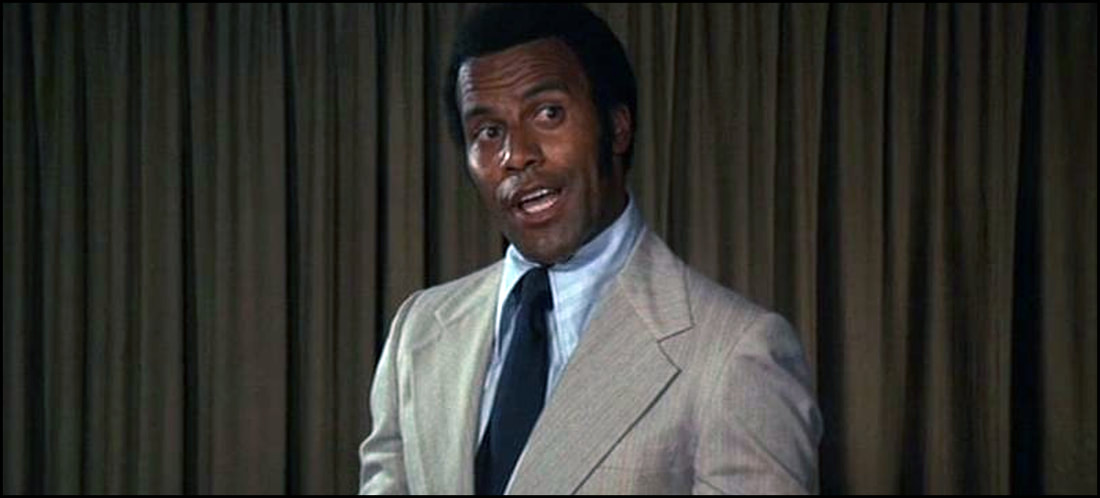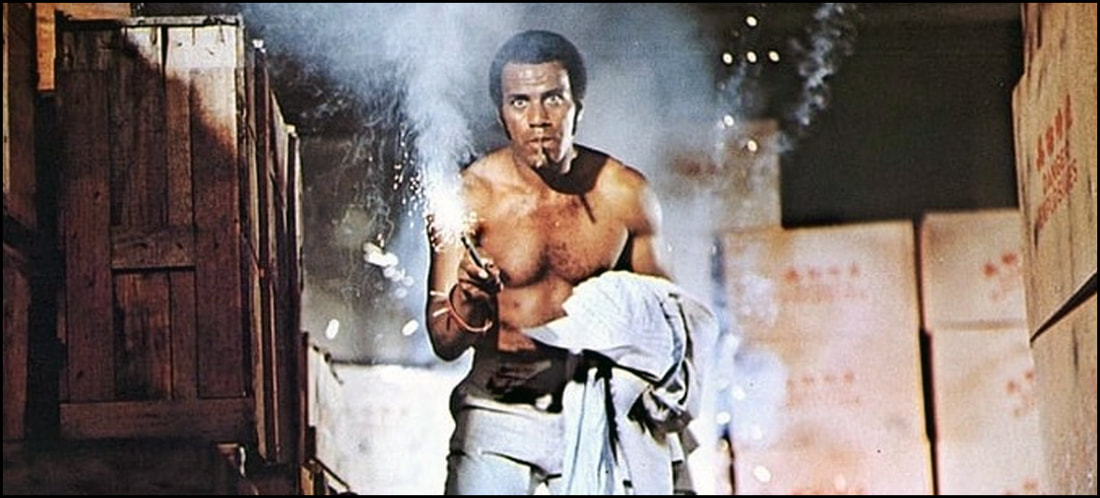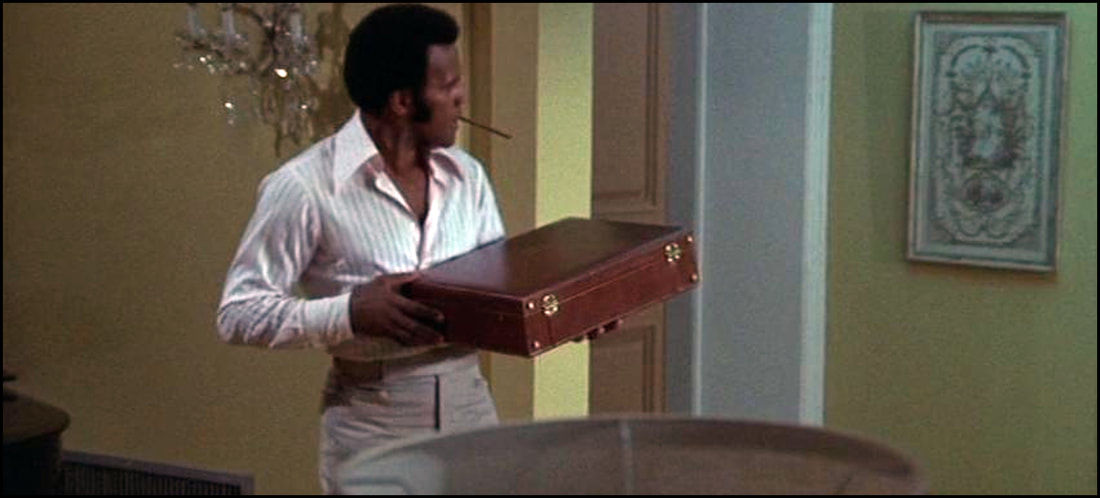Granted, he wasn’t one of what I’d call a ‘mainstage’ guest for the event. He was part of a panel of guest players who had paid visits in their time to the world of the original Star Trek; but thankfully these actors and actresses are given free reign to discuss practically any and all chapters of their professional careers. Having heard the man speak once or twice in television interviews, I was looking forward to it, and – even though only provided a few minutes of speaking time – ‘the Hammer’ (as he’s affectionately known) definitely delivered.
To his credit, Williamson reached a point in his career wherein he only pursued projects that met his three requirements. First, he never lost a fight. Don’t think he wouldn’t take a few hits here and there because that was far from the truth. Clearly, he loved to ‘mix it up’ on screen, but he never lost those mix-ups. Second, no matter the circumstances, he never allowed his characters to die on film. Williamson was a survivor, and he insisted on taking roles that furthered this desire. Lastly – and probably his favorite – he only took parts wherein – if he wanted – he could get the girl. Is there anything wrong with that? I don’t think so.
Ultimately, 1973’s That Man Bolt gave ‘the Hammer’ all that he could’ve ever wanted in a silver screen outing, and – dare I mention – it was nearly a franchise. (Don’t worry: I’ll get into that in some detail below.) A kinda/sorta international man of mystery, Jefferson Bolt was a professional courier who took the jobs too dangerous for others and too risky for those with the usual moral hangups. Independently wealthy and trained to kill, he wasn’t above setting aside some quiet time with the ladies, of which Bolt has quite a few. When trouble called, you wanted a man like Bolt answering, and Williamson – as expected – did the role justice in only the way a box office star could.
It's a damn dirty shame we didn’t see more of That Man Bolt. A damn dirty shame, indeed.
(NOTE: The following review will contain minor spoilers necessary solely for the discussion of plot and/or characters. If you’re the kind of reader who prefers a review entirely spoiler-free, then I’d encourage you to skip down to the last few paragraphs for the final assessment. If, however, you’re accepting of a few modest hints at ‘things to come,’ then read on …)
From the film’s IMDB.com page citation:
“To take a briefcase from Hong Kong to Mexico City, via Los Angeles, is it necessary to call on that man – Bolt? With the number of dangerous spies and gangsters who are after that briefcase, maybe Jefferson Bolt is not enough.”
In the meantime, directors Henry Levin and David Lowell Rich did a respectable job delivering a mostly respectable action picture, though I’d argue that the script from Charles Eric Johnson and Ranald MacDougall never quite clearly enough spelled out all of the necessary particulars. It’s clear that Bolt is both a ‘man of action’ and a ‘man of the world,’ but the various service organizations he apparently crosses paths with could’ve used a wealth more explanation here. Granted, the spy services are known to overlap a bit, especially when just cooperation is required on the international stage; only the script comes up short in defining just whose national interests are effectively being served, and that does the narrative no favors in the second half.
Still, too very much of the film feels more like a ‘big idea’ instead of a ‘great script,’ and the ambiguity of just who works for whom hampers any forward progress that Williamson’s machismo can assemble. Meant to be a kinda/sorta 007 clone, the big difference between those two characters is that – while Bond serves Great Britain faithfully if even to a fault – Bolt likes to make his own way in the world. He’s much more anti-hero than hero, and the last scene with our heavy hitter strolling into the sunset with a briefcase of cash proves that – when the chips are down – Bolt’s not above taking the money and running. Is that a bad choice? Well, no, not as designed here. It just limits where future adventures could’ve taken the courier unless he went to work for someone else instead of paying his own way on the silver screen.
It goes without saying that Bolt surrounds himself with the kind of supporting players audiences expect from a Bond-like environment. There are snippy Brits. There are cunning foreigners. There are deadly assassins. There are many lovely ladies. There’s even a gadget or two thrown in for good measure. So – as formulaic outings go – Bolt’s movers and shakers certainly had an idea of how to put their hero on the primrose path … so it’s unfortunate that this ended up being the only film to explore this possible universe.
Functionally, Bolt proceeds very much like a picture meant to craft an all-new action franchise for the star; and – in the interview provided on the Kino Lorber release – Williamson admits that was the intention of the producers. (He mentions the possibility of three films contractually, though he never spells out perfectly that these were going to be Bolt sequels. It is, still, very strongly implied that this was the case.) However, the film had the misfortunate of finding life (and an audience) largely smack-dab in the middle of Hollywood’s much-maligned Blaxploitation Era, despite incorporating vastly different storytelling tropes and thematic sensibilities than releases plagued with racial undertones. Instead of continuing with the planned follow-ups and risking their industry reputation, Universal Pictures bought out Williamson’s contract and shelved the deal.
Also, I’d be remiss in my duties as a Social Media Influencer if I failed to mention that the film does contain at least two sequences wherein some decidedly inappropriate (i.e. racist) language was used. (There may’ve been more, but I’m only citing the two that I specifically caught.) These derogative racial terms were somewhat common to features dated from a forgotten era; while I’m perfectly capable of keeping that in mind when watching older releases getting new life in the marketplace, I do realize that not all folks are … so consider yourself properly warned.
That Man Bolt (1973) was produced by Universal Pictures. DVD distribution (for this particular release) is being coordinated by the good folks at Kino Lorber. As for the technical specifications? While I’m no trained video expert, I thought the sights-and-sounds of this release were, generally, quite good; there are a few sequences a bit inferior, but I’m guessing that they attribute back to the source used. Lastly, if you’re looking for special features? Well, that’s a bit disappointing. There is a plethora of trailers for some associated home video releases, but otherwise the disc boasts only a fifteen-minute interview with star Williamson. It’s nice, yes, but it’s a bit superficial, too. Meh.
Recommended.
About the best thing that can honestly be said about That Man Bolt is that it works reasonably well as a kinda/sorta ‘origins’ picture. (Allegedly, there were plans for more, but none materialized for some very specific reasons discussed above.) It’s a good ‘jumping on’ point for what could’ve been a mid-level entry of the thriller pictures subgenre, and Williamson does an affable enough job doing what Williamson has always done: kick butt, take names, kiss ladies, and never dies. In some ways, it feels a bit like a bloated television attempt, but that might be owed in part to the fact that it had two different directors, giving it occasionally two different feels, if that makes sense.
In the interests of fairness, I’m pleased to disclose that the fine folks at Kino Lorber provided me with a complimentary Blu-ray of That Man Bolt (1973) by request for the expressed purposes of completing this review; and their contribution to me in no way, shape, or form influenced my opinion of it.
-- EZ




 RSS Feed
RSS Feed